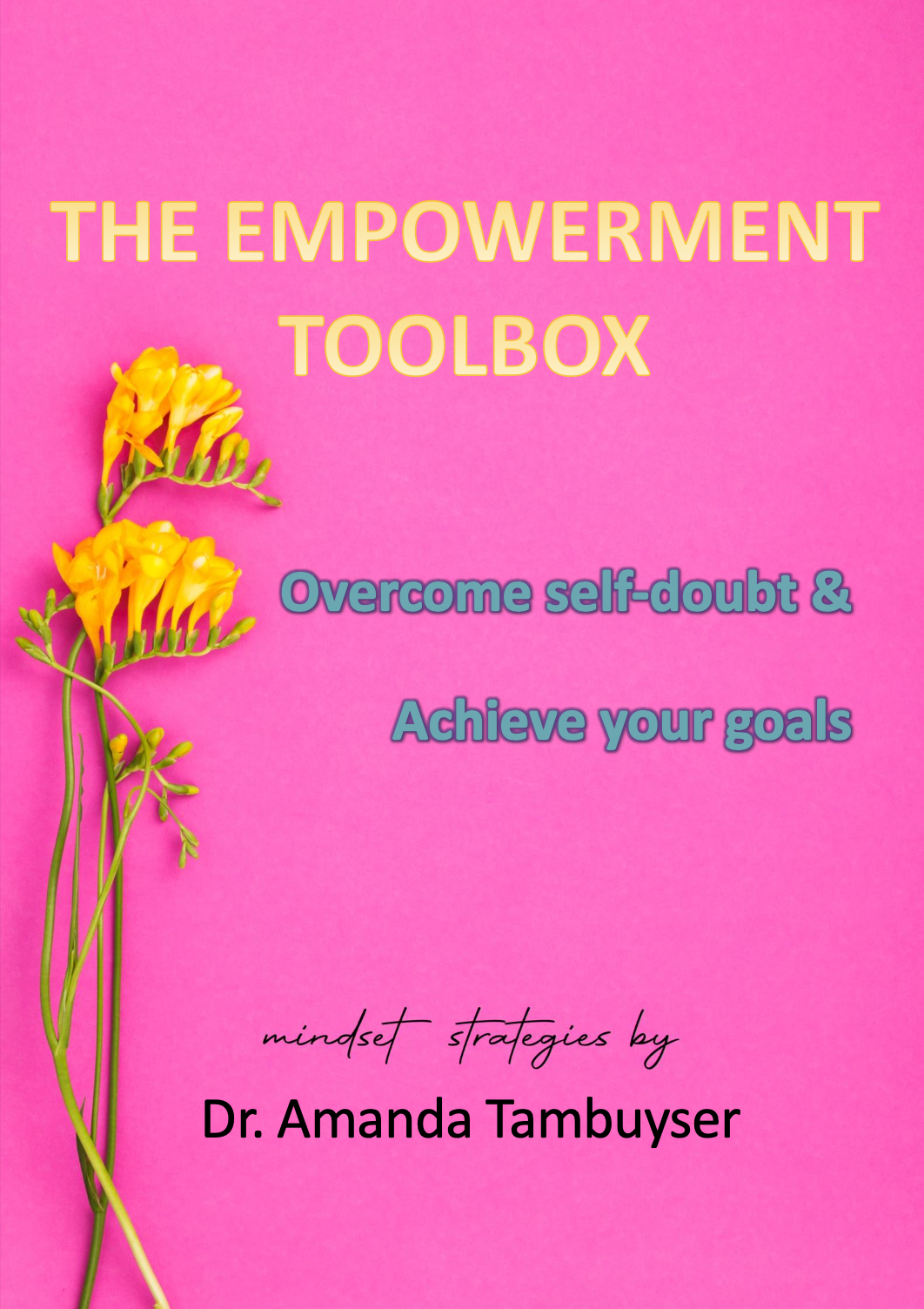FREE RESOURCES
Articles, E-book, Tips & Inspiration
The Secret to Stop Being Overlooked
Overwhelmed and Under Appreciated
Free video mini-course
Start your journey here!

Access Exclusive Content


The Empowerment Toolbox: Overcome Self-Doubt & achieve your goals
Embark on a transformative journey with "The Empowerment Toolbox: Overcome Self-Doubt & Achieve Your Goals," a comprehensive guide by Dr. Amanda Tambuyser designed to reshape your mindset and propel you toward success. This eBook is a treasure trove of mindset hacks and practical tools aimed at individuals seeking personal growth, career advancement, or enhanced well-being.
Key Highlights:
- Unlocking the Power of Mindset: Learn to cultivate the right mindset, a transformative tool that can reshape our reality, overcoming self-doubt and unlocking full potential.
- Core Beliefs and Their Impact: Explore how core beliefs shape our perceptions and responses to the world, and the importance of recalibrating unhealthy core beliefs for a resilient and empowering mindset.
- Practical Mindset Strategies: Dive into actionable strategies for daily integration, including cultivating a growth mindset, practicing self-compassion, and setting realistic goals.
- Harnessing Neuroplasticity: Understand the brain's flexibility and how intentionally moulding our neural pathways can lead to profound changes in thought patterns and behaviours.
Dr. Tambuyser's guide emphasises that overcoming self-doubt is a continuous journey that requires dedication and practice.
By integrating these mindset hacks into your daily life, you can gradually build confidence, silence your inner critic, and embark on a journey of self-discovery and success. A positive mindset is a powerful force that can transform self-doubt into unwavering self-belief, unlocking the potential for personal growth and achievement.
Please Fill Out This Form To Receive Your PDF.

Where Does My Energy Go? Unraveling the Mysteries of Vitality in an Energized Soul
In the relentless rhythm of modern life, it's not uncommon to find ourselves at the end of the day wondering, "Where does my energy go?" The enigmatic nature of our vitality often leaves us feeling drained and fatigued without a clear understanding of the forces at play.
In this blog post, we embark on a journey to unravel the intricate mysteries of energy—examining its physical, emotional, and environmental dimensions. By delving into the factors that influence our vitality, we seek not only to identify energy drains but also to discover strategies for reclaiming and rejuvenating our life force.
The Dance of Physical Energy
Physical energy is the foundation upon which our daily lives rest. It powers our movements, thoughts, and basic bodily functions. Understanding the dynamics of physical energy involves exploring the interplay of sleep quality, nutrition, and physical activity.
1. The Sleep Conundrum:
Quality sleep is the bedrock of physical well-being. Yet, in the fast-paced world we inhabit, sleep often takes a back seat. Insufficient or poor-quality sleep disrupts the body's ability to rejuvenate, leaving us groggy and energy-deprived. Establishing consistent sleep patterns and creating a conducive sleep environment are essential for preserving and enhancing physical energy.
2. Nutrient-Rich Fuel:
The food we consume serves as the fuel for our bodies. Nutrient-rich meals provide sustained energy, while poor dietary choices can lead to energy slumps. A balanced diet, rich in vitamins, minerals, and antioxidants, ensures a steady supply of energy throughout the day. Hydration is equally crucial, as even mild dehydration can contribute to feelings of fatigue.
2. Movement as Energy Catalyst:
Contrary to the misconception that physical activity depletes energy, regular exercise is a powerful energy catalyst. It enhances circulation, oxygenates the body, and triggers the release of endorphins—neurotransmitters associated with mood and energy. Incorporating physical activity into daily routines contributes not only to physical well-being but also to sustained vitality.
Emotional Energy Reservoirs and Drains
Our emotional landscape is a significant contributor to our overall energy balance. Exploring the intricacies of emotional energy involves recognizing and addressing both reservoirs and drains.
1. The Power of Positive Emotions:
Positive emotions serve as energy reservoirs, fueling our vitality and fostering resilience. Joy, gratitude, and love contribute to an emotional wellspring that sustains us through challenges. Cultivating mindfulness and gratitude practices can amplify these positive emotions, creating a buffer against emotional fatigue.
2. Negative Thought Patterns:
On the flip side, negative thought patterns act as insidious energy drains. Constant self-criticism, worry, and anxiety consume mental and emotional energy, leaving us fatigued. Identifying and challenging these patterns through techniques like cognitive-behavioral therapy (CBT) can prevent the steady leak of emotional vitality.
3. Unresolved Emotions as Energy Sinks:
Suppressed or unresolved emotions are silent energy sinks. Lingering grief, unexpressed anger, or unresolved conflicts can linger in the background, draining emotional reserves. Embracing therapeutic practices, such as journaling or seeking professional guidance, can facilitate the release of these emotional burdens.
4. Stress and Over commitment:
Chronic stress, often fueled by over commitment and a relentless pursuit of perfection, is a notorious energy thief. Learning stress management techniques, setting realistic expectations, and embracing the art of saying 'no' are critical for preserving emotional energy.
The Influence of Environmental Energies
Beyond our physical and emotional realms, our surroundings play a profound role in shaping our energy levels. Creating an environment that fosters positive energy involves addressing factors such as clutter, natural elements, and the quality of relationships.
1. The Impact of Clutter:
A cluttered and disorganized environment creates mental chaos, diverting energy toward managing the visual and mental noise. Decluttering spaces—both physical and digital—clears the path for focused thinking, enhanced productivity, and a sense of calm.
2. Nature's Rejuvenating Touch:
Exposure to natural light and immersion in nature contribute to heightened energy levels. Sunlight, with its mood-boosting benefits, triggers the release of serotonin. Similarly, spending time outdoors has been linked to reduced stress and increased vitality.
3. Toxic Relationships as Energy Drains:
Relationships that breed negativity or toxicity can be significant energy drains. Recognizing and, when necessary, disengaging from such relationships is vital for preserving emotional and mental energy. Surrounding yourself with positive influences fosters an environment conducive to sustained vitality.
Energy Investments and Returns
Energy is not just spent; it can also be strategically invested to yield higher returns. This section explores how allocating energy to passion, personal growth, and connections can enhance overall vitality.
1. Passion and Purpose as Energy Boosters:
Investing energy in activities aligned with passion and purpose yields profound returns. Engaging in work, hobbies, or relationships that resonate with personal values and aspirations contributes to a sense of fulfillment and sustained energy.
2. Continuous Learning and Personal Growth:
Investing in personal growth and continual learning is an investment in energy reserves. The pursuit of knowledge, the development of new skills, and self-discovery stimulate the mind, fostering a sense of accomplishment and vitality.
3. Connection and Community:
Building and nurturing positive connections contribute significantly to emotional well-being. Whether through friendships, family bonds, or a sense of community, investing energy in building meaningful relationships creates an emotional reservoir that sustains vitality through life's challenges.
Reclaiming and Rejuvenating Your Energy
With a comprehensive understanding of the factors influencing energy, it's time to explore strategies for reclaiming and rejuvenating vitality.
1. Self-Care Rituals for Holistic Well-being:
Prioritize self-care rituals that cater to physical, emotional, and mental well-being. Adequate sleep, nourishing meals, regular exercise, and activities that bring joy and relaxation contribute to overall vitality.
2. Mindfulness and Meditation Practices:
Mindfulness and meditation are powerful tools for preserving mental and emotional energy. These practices cultivate a sense of calm, reduce stress, and enhance overall well-being.
3. Establishing Boundaries:
Learning to set and enforce boundaries is crucial for preserving energy. Recognize your limits and prioritize activities that align with your goals and values. Saying 'no' when necessary is an act of self-preservation.
Conclusion
In the intricate tapestry of life, understanding where our energy goes is paramount to cultivating a vibrant and fulfilling existence. From the physical foundations of sleep and nutrition to the emotional complexities of stress and relationships, each thread contributes to the overall picture of our vitality. By unraveling these threads and implementing strategies to reclaim and rejuvenate our energy, we can take control of our life force. With purposeful intention and a holistic approach, we ensure that our energy flows abundantly, propelling us towards a life marked by vitality, resilience, and a profound sense of fulfillment.
FAQs
1. Why is quality sleep emphasized as a crucial factor in preserving physical energy?
Quality sleep is essential for physical well-being because it allows the body to rejuvenate and repair itself. Insufficient or poor-quality sleep disrupts this process, leading to grogginess and energy depletion. Establishing consistent sleep patterns and creating a conducive sleep environment are vital for preserving and enhancing physical energy.
2. How can negative thought patterns impact emotional energy, and what can be done to address them?
Negative thought patterns act as energy drains by consuming mental and emotional energy, leaving individuals fatigued. Techniques such as cognitive-behavioral therapy (CBT) can be employed to identify and challenge these patterns, preventing the steady leak of emotional vitality. Cultivating mindfulness and gratitude practices can also amplify positive emotions, creating a buffer against emotional fatigue.
3. What role do relationships play in preserving energy, and how can one deal with toxic relationships?
Positive connections significantly contribute to emotional well-being, while toxic relationships can be substantial energy drains. Recognizing and, when necessary, disengaging from negative relationships is crucial for preserving emotional and mental energy. Surrounding oneself with positive influences fosters an environment conducive to sustained vitality.
